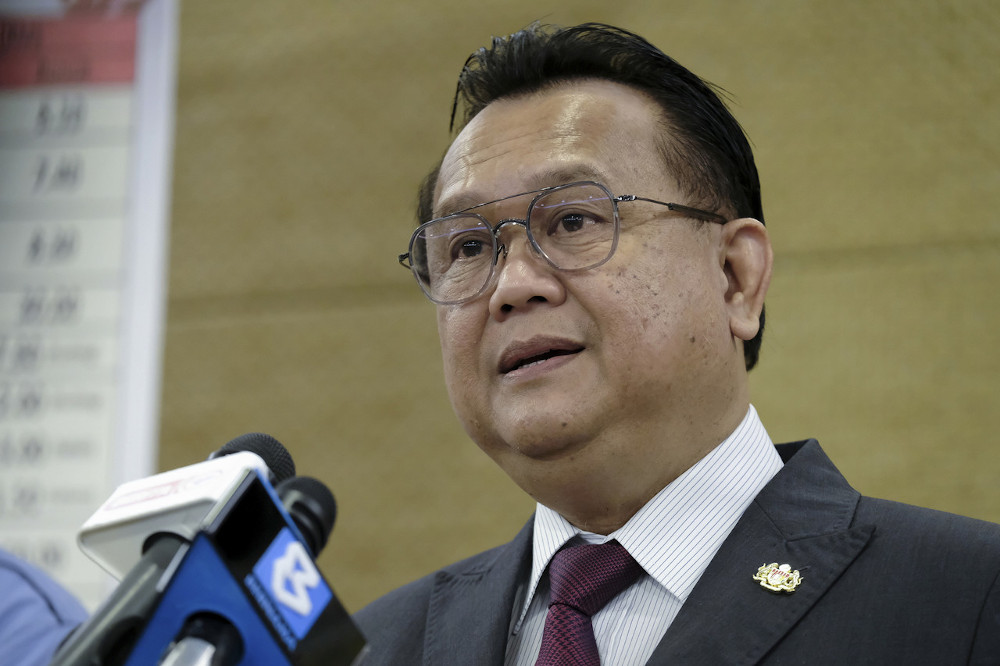
Subscribe to our Telegram channel for the latest updates on news you need to know.
PUTRAJAYA, April 13 — The government is still maintaining a subsidised cooking oil quota of 60,000 tonnes per month despite the increase in the price of refined, bleached and deodorised (RBD) palm oil, says Domestic Trade and Consumer Affairs (KPDNHEP) Minister Datuk Seri Alexander Nanta Linggi.
This is equivalent to 60 million one-kilogramme (kg) polybag packets, with 1.5 kg allocated for every Malaysian, including in Sabah and Sarawak.
Nanta said RBD palm oil increased by about 83 per cent to RM4,122 per tonne this year compared to RM2,255 per tonne in 2020.
“The government has also increased the allocation based on a commitment to supply 60,000 tonnes although the price of RBD palm olein has gone up,” he said, adding that the government expected the cost of the subsidy scheme to increase from RM400 million to RM1.8 billion if the price of RBD palm olein continued to rise.
“As such, the government’s decision to maintain the quota in the Cooking Oil Stabilisation Scheme (COSS) shows the government’s high commitment to reduce the cost of living and ensure the well-being of the people,” he said in a statement today.
The statement was issued following news reports on alleged shortage of subsidised cooking oil in Sarawak which stemmed from the dishonest action of cooking oil packaging companies of not supplying subsidised cooking oil in prescribed quantities for distribution to supermarkets and grocery stores.
The report also suggested that KPDNHEP step up monitoring and enforcement on subsidised cooking oil packaging activities and ensure that the RM400 million cooking oil subsidy allocation this year is spent prudently.
Nanta said KPDNHEP’s enforcement division always conducted comprehensive audits to ensure that every subsidised cooking oil production was acceptable in each of its distribution chains.
Following the audit and stern action in tackling the leakage of subsidised cooking oil distribution, Nanta said a total of 318 cases had been recorded nationwide from 2016 to March 2021.
During the same period, four cooking oil packaging companies were taken to task by cancelling the quotas given to them earlier, he said.
On complaints related to cooking oil in Sarawak, Nanta said a review of records found that there had been 25 complaints since 2020 until March 31 (2021) and 4,221 inspections conducted on premises selling cooking oil until yesterday (April 12).
On the sugar issue which was also touched on in the news report, Nanta said in principle, the selling price of domestic sugar was controlled at a maximum price of RM2.85 per kg for coarse refined white sugar and RM2.95 per kg for refined white sugar for retail sale.
The wholesale selling price of sugar for use in the food and beverage (F&B) industry is set at RM2.77 per kg for coarse refined white sugar and RM2.85 per kg for refined white sugar.
“The difference in lower sugar prices can be enjoyed by F&B companies based on the quantity and method of purchase agreed upon with the supplier, and also depending on the price of raw sugar in the world market without government intervention,” he said.
According to the news report, the F&B industry now has to spend more to get refined sugar at RM2.75 per kg.
Nanta said local F&B companies and wholesalers could apply for permits to import refined sugar at any time of the year.
“Eligible applications will be carefully considered by an evaluation committee represented by several relevant government agencies including the Ministry of International Trade and Industry, the Malaysian Investment Development Authority and the Royal Malaysian Customs Department, he said.
“The priority of issuing import permits is to any F&B manufacturing company and wholesaler that meets the evaluation criteria set,” he added.
Nanta said continuous monitoring would be carried out on the recipients of permits to import refined sugar to prevent misuse and misappropriation, and enforcement action would be taken against those who misused the permits to import refined sugar. — Bernama


